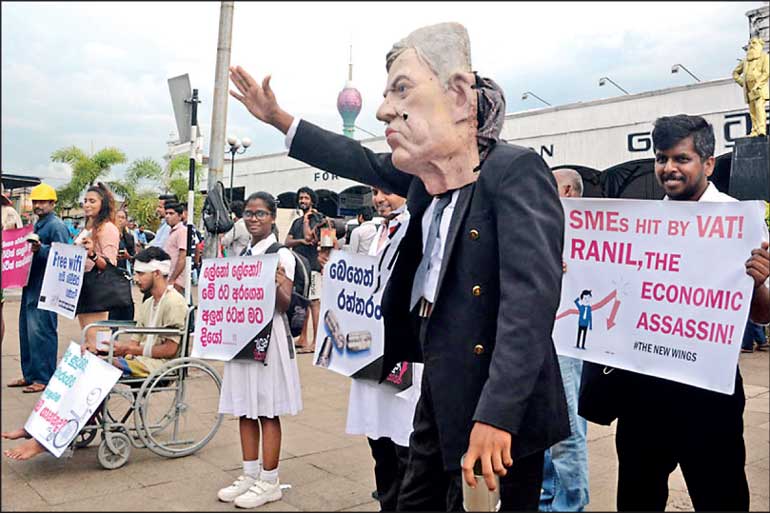Sunday Feb 22, 2026
Sunday Feb 22, 2026
Tuesday, 9 January 2024 01:22 - - {{hitsCtrl.values.hits}}

An activist group known as ‘New Wings’ yesterday staged a protest in Colombo against the recent increase in Value-Added Tax (VAT) to 18% by the Government with the intention of increasing State revenue to over Rs. 4 trillion in 2024 and mandatory Tax Identification Numbers (TIN) system – Pic by Pradeep Pathirana
|
State Minister of Finance Ranjith Siyambalapitiya
|
State Minister of Finance Ranjith Siyambalapitiya yesterday outlined the urgency of incorporating the remaining 500,000 tax evaders into the tax system, noting that the Government is gearing up for significant tax reforms.
“Out of one million individuals with the financial capacity to pay income tax, only 500,000 are currently meeting this obligation,” he said at a media briefing held at the Presidential Media Centre under the theme ‘Collective Path to a Stable Country’.
State Minister underscored that in developed nations, being a taxpayer is acknowledged as a sign of a robust citizen actively contributing to the country’s stability. He also expressed optimism that the citizens of this country will undergo a positive shift in attitude, thereby fostering development within the nation.
Siyambalapitiya said the preparations are underway to commence the implementation of the Tax Identification Number (TIN) from 1 February.
“TIN registration issues are currently being dealt with, primarily because this is a new experience for the people. Efforts are being made to address these challenges at the Divisional Secretariat level, with the intention of resolving them through an online system,” he stressed.
He said a total of 1,705,233 tax files stood at the end of 2019 and was decreased to 437,547 by the end of 2022. However, with the new policies introduced by the Government, the number of tax files has increased to 1,002,029 by 31 December 2023. “This shows there are more taxable individuals who are evading the tax responsibility,” he added.
He also said by the end of last year, the State revenue, which was 8% of the Gross Domestic Product (GDP), had increased to 10%. The Government aims to further elevate it to 12% of GDP by the end of the year and set a target of reaching 15% by 2025 to establish a country with a stable economy.
Moreover, Siyambalapitiya said amendments have been introduced for Value Added Tax (VAT). “The VAT rate, previously at 15% was increased to 18% while the VAT limit previously set at Rs. 80 million is decreased to Rs. 60 million. Since the introduction of the VAT Act in 2001, all goods and services were initially subject to VAT, but subsequent tax amendment acts gradually exempted certain items. In the latest amendment, 97 out of 138 exempted goods and services have been re-added,” he explained.
“Amendments have been introduced for Value Added Tax (VAT), including an increase in the rate from 15% to 18% and a decrease in the VAT limit from Rs. 80 million to Rs. 60 million. The Government anticipates that the VAT revision will contribute an additional 2.07% to state revenue as a percentage of the general GDP, amounting to Rs. 645 billion,” the State Minister said.
He also stressed the importance of decreasing indirect taxes and increasing the direct tax rate for a more stable economy.
“Presently, direct taxes constitute 30%, while indirect taxes make up 70% of the tax structure. Our objective is to shift this balance and raise the direct tax rate to 40%. This adjustment aligns with the conditions of developed countries and promotes social justice,” he added.
Siyambalapitiya emphasised the need for everyone to embrace this change in attitude for the overall development of the country. “Therefore, the success of this program relies on the contribution of each individual,” he added.
Acknowledging that the increase in tax rates may lead to a 2.5% rise in inflation, he said the Central Bank and the Finance Ministry express confidence in bringing it back to 5% within two or three months, aided by a reduction in the electricity bill.